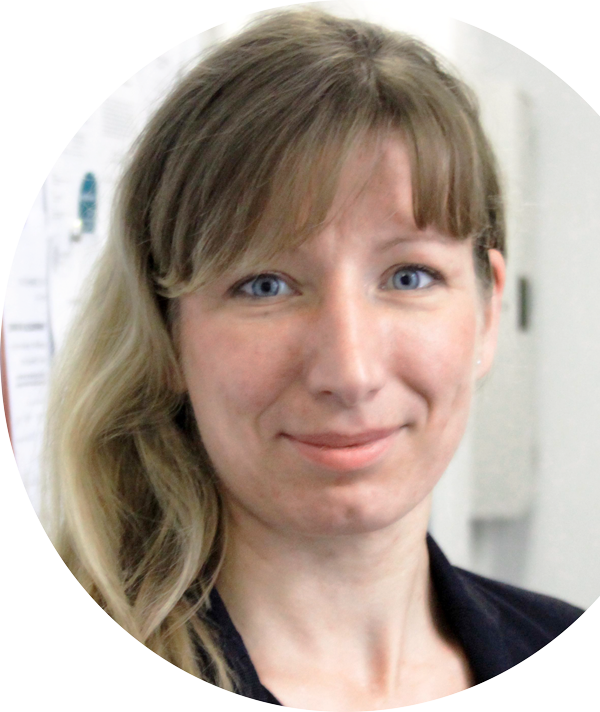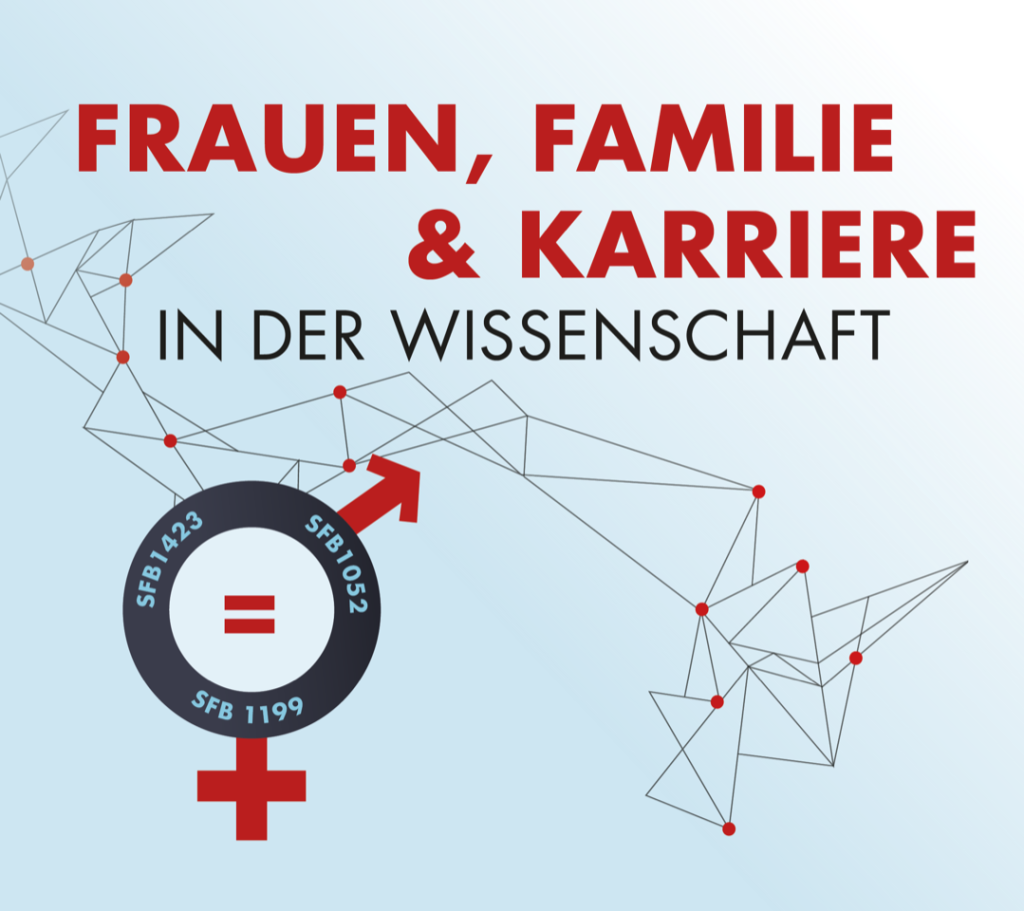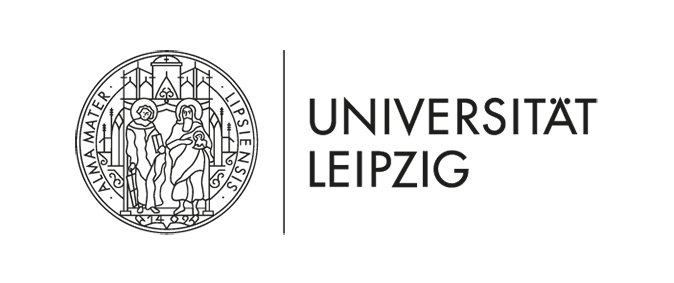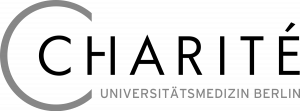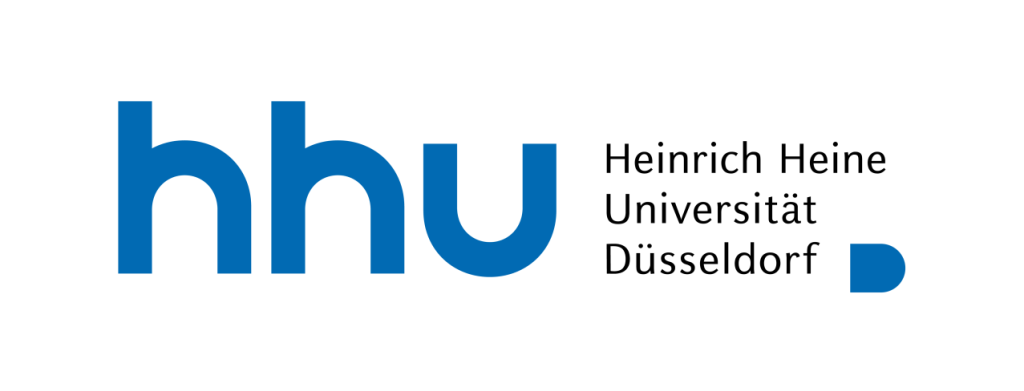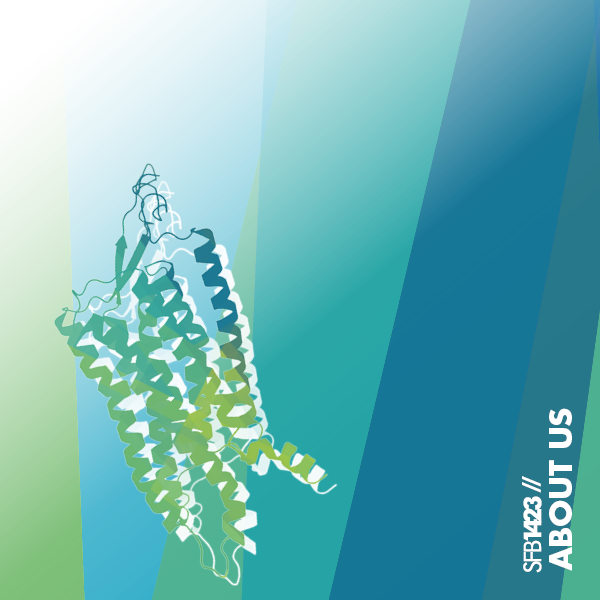

Gender-equality and diversity of the SFB1423
The SFB1423 is committed to diversity, gender equality and gender justice and regards the implementation of corresponding standards as a strategic management task. The Board will facilitate activities and discussions to achieve that everyone at SFB1423 should be able to work with pleasure and without severe limitations, independent of whether they have a family, come from a different culture or have a disability.
Gender-equality and diversity measurements
- Internal mentoring program for female scientists for research development and career planning;
- Scientific talks and round table meetings with female scientists to foster the topic;
- Promotion and funding at the program T.E.A.M. Basecamp.
- Career development workshops and networking events for female PhD students, postdoctoral researchers, junior group leaders and habilitation candidates;
- Actively promote recruitment of female postdocs, female group leaders and female researchers in general.
- We will provide child care during CRC/IRTG-events if child care is not covered otherwise;
- Local events will preferably be held during common childcare facility opening hours and annual conventions, summer schools and other Research Training Group specific scientific conferences will preferably be organized outside of local school vacation periods;
- Maximal flexibility of working hours for CRC members with family obligations will be offered;
- Possibilities and infrastructure to do work from home will be structurally and, if needed also financially, supported in order to reduce conflicts with child care;
- Opportunity for parents to bring their child to work when there are unexpected problems with the normal child care. In this case the CRC offers a special mobile piece of furniture (the so-called KidsBox), which enables parents to create a small play-room for kids nearby their office desk.
- Relief funds for committee activities in academic self-governance, journal reviewer activities, etc.;
- Opportunities for extended financing and support by student assistants (especially in the candidate’s laboratories) are available and are encouraged during pregnancy, breastfeeding and family-related part-time work to reduce the burden of routine work;
- Promotion of individual childcare, whereby only measures can be financed which are outside the local opening hours of the day-care centres and where the parents cannot be reached for project-specific reasons or in case of illness;
- Emergency family care fund for CRC members will be established;
- Travel allowances for researchers with children under 3 years who need to take their child and a caretaker to a conference;
- Financing holiday care for children up to 12 years, when regular care is not available.
- Promotion (financing or provision) of quiet rooms for medical measures (medication), family related issues or for intercultural rituals (e.g., prayers) will be provided in the facilities – if possible.;
- Award for intercultural commitment;
- Action day on inclusion and diversity with advisory services and awareness-raising, participation in German Diversity Day;
- Implementation of diversity elements in further training and qualification programs or targeted training courses:
– Training courses and workshops on “unconscious biases”
– Integration of diversity aspects into continuing education programs and university teaching
– Intercultural training
– Fair and appreciative appointment and recruitment procedures
– Further training in the legal field, e.g. on the AGG, the relevant State Equal Opportunities Act etc.
– Further qualification of the various confidential counsellors at the advice centers and the complaints office
– Diversity-sensitive promotion of junior staff – promotion of doctoral students and postdocs with chronic illnesses and disability
– Sensitization offers for all status groups, but especially for managers in science and administration - Financial support for e.g. Language courses especially for refugees, Hardship grant for doctoral candidates, Promotion of international mobility, Diversity-sensitive teaching.
All members of the CRC can make use of equal opportunities’ funds after application to the Board in advance. Application shall be sent to the Scientific co-ordinator and have to be accepted by the Board prior to starting.
Equality and Diversity WORKSHOPS:
Equal opportunities and diversity in research collaborations
PROGRAM (2024 – 2025)
The HYP*MOL (TRR386), (AC)³ (TRR172), ¹²³H (RTG 2721), FOR2857 and the SFB1423 combine their resources and organise a workshop series to sustainably further the common goal of promoting equal opportunities and diversity in research collaborations. The pooling strategy enables gender equality activities directly oriented towards the centres’ needs and provides a collaborative exchange platform. The diverse workshops and training opportunities on gender equality topics will be combined with an opening lecture on the personal career path of a female scientist in one of our research networks. Take the opportunity to get to know five excellent female scientists with different career paths and learn about their stations, motivations and also obstacles in the university sector. Please REGISTER NOW >>
13:30 – 14:30
Woman in Science – Professional Career Insight:
Prof. Dr. Georgeta Salvan (TU Chemnitz, Semiconductor Physics)
14:30 – 16:00
Intercultural mindset & communication
Dr. Rohac
[TBA]
13:30 – 14:30
Woman in Science – Professional Career Insight:
Prof. Dr. Marlene Kretzschmer (Leipzig University, Meterology)
14:30 – 16:00
Gender Bias: How to act!
Melanie Bittner
Only in 2053 will 50% of professorships be held by women if gender equality in higher education progresses as it has in recent years. This workshop will give you an overview of the most important measures for diversity, equity and inclusion (DEI) at universities. You will practice recognizing and questioning common stereotypes and discuss strategies to fight gender biases.
13:30 – 14:30
Woman in Science – Professional Career Insight:
PD Dr. Agnieszka Beata Kuc (HZDR, Theoretical Chemistry)
14:30 – 16:00
Plan B in Science!
Kathrin Vallund
This workshop will help you understand yourself and your career ambitions better. What is the right place for you and what do you need to perform at your best while being happy? You will learn about your personality type and the impact it has in relation to your next career steps. There will be room for exchange between the participants.
13:30 – 14:30
Woman in Science – Professional Career Insight:
Prof. Dr. Claudia Schnohr (Leipzig University, Solid State Physics)
15:00 – 17:00
Leadership: Principle of Arrogance for female scientists (Part 1)
Dr. Karin Greiner-Simank (@Moddler)
In these seminars, women in management positions in all sectors can try out specific ways of gaining more respect and recognition from male superiors, colleagues, customers and employees.
13:30 – 14:30
Woman in Science – Professional Career Insight:
Dr. Anette Kaiser (Leipzig University, Medical Faculty)
15:00 – 17:00
Leadership: Principle of Arrogance for female scientists (Part 2)
Dr. Karin Greiner-Simank (@Moddler)
In these seminars, women in management positions in all sectors can try out specific ways of gaining more respect and recognition from male superiors, colleagues, customers and employees.
Equality & Diversity Pooling Program 2024
REGISTRATION
PROGRAM (2021 – 2022)
The SFB1052, the SFB1199, the SFB1423 and the TRR67 pool gender equality measures, ideas and offers to sustainably establish the common goal of promoting equal opportunities in research collaborations. The pooling strategy enables gender equality activities directly oriented towards the centres’ needs and provides a collaborative exchange platform. The varied workshops and training programs will be combined with an opening lecture about the personal career path of a female scientist working in the research alliance.
SFB1052, SFB1199 and SFB1423 are organizing a panel discussion on “Women, Family and Career in Science” on 20.06.22 from 11 a.m. to 1 p.m. at STUK Leipzig (Nürnbergerstraße), followed by a networking meeting.
For the panel discussion, we have invited female professors and young scientists who will briefly talk about their personal career paths and present their most important decisions and turning points. Afterwards, there will be the opportunity to network with each other at a “market of opportunities” during a lunchtime snack. The event is supported by the Research Academy Leipzig and the Equal Opportunities Office of the University of Leipzig.
We will gladly accept your registration via the online registration form or by email to . The panel discussion is in German.
14:00 – 15:00
Woman in Science – Professional Career Insight:
Prof. Dr. Dr. Ines Liebscher (Leipzig University, Medical Faculty)
15:00 – 17:00
Gender Bias: How to act!
Dr. Nicola Byok (Leadership-Strategies)
This class will strengthen and empower women. It will help them see the often-invisible obstacles for them in the workplace: stereotypes and unconscious biases. The participants will learn how stereotypes and unconscious biases come about and they will discuss the most common stereotypes for women and also for men. Then, they will be shown how these stereotypes affect them in the workplace and finally, how they can counter these effects.
In the second part of the class there will be peer supervision. The participants will be able to discuss their individual cases and experiences, and take home ideas how to handle these situations in the future.
14:00 – 15:00
Woman in Science – Professional Career Insight:
Dr. Rima Chakaroun (Universitätsklinikum Leipzig, Nephrology)
15:00 – 17:00
Job Application Training & Tips
Dr. Matthias Schwarzkopf (Coaching and Training)
The workshop will aim to inform participants about the main challenges of writing applications for jobs in science. Furthermore, questions are answered: What are the “standard documents”? What information should I get in advance? Why am I relevant to the job – developing your own visibility.
14:00 – 15:00
Woman in Science – Professional Career Insight:
Dr. Dr. Diana Le Duc (Leipzig University, Human Genetics)
15:00 – 17:00
Equal Opportunities in Academic Teaching
Melanie Bittner (Toolbox Gender&Diversity in Academic Teaching at FU Berlin)
Student diversity is part of the reality of everyday university life. However, there are still inequalities based on race, class, gender and other social categories in higher education. What does this mean for your courses? How can you create a space that considers the diversity of students as positive value and actively contributes to equal opportunities for all students? This interactive presentation will focus on the reflection of inequality in higher education as well as hands-on-advice for academic teaching.
14:00 – 15:00
Woman in Science – Professional Career Insight:
Dr. Steffi Marung (Leipzig University, Global and European Studies)
15:00 – 17:00
Networking for Young Female Researchers
Siofra McSherry (Scienza Science Coaching Berlin)
It is widespread consensus that networking skills are a vital ingredient in a successful academic career. Yet, we rarely talk about the gender-specific challenges that female researchers face in this area. The workshop will interactively elaborate on the issue and help develop approaches to action.
15:00 – 15:30
Karriereeinblick – Woman in Science:
Prof. Dr. Annette Beck-Sickinger (Universität Leipzig, Biochemie)
15:30 – 17:30
Gender Bias: Chancengleichheit an Hochschulen I Sinah Hegerfeld & Maria Kropp (Genderkompetenzzentrum Sachsen, Dresden)
In der Praxis zeigen sich trotz Gleichstellungskonzepten, Gleichstellungsbeauftragte*n, Fördermaßnahmen und einem gestiegenen Bewusstsein für die Notwendigkeit von Chancengleichheit immer noch Hürden und Handlungsbedarfe. Im Workshop werden die Teilnehmer*innen informiert und zum Austausch darüber angeregt: Welche Gender Bias gibt es an Hochschulen und wie wirken sie? Welche Barrieren stellen sich insbesondere Nach-wuchswissenschaftlerinnen an Hochschulen? Welche Handlungsoptionen/Good Practices haben sich bewährt.
14:30 – 15:00
Karriereeinblick – Woman in Science
Prof. Dr. Antje Körner (Uniklinikum Leipzig, Medizin)
15:00 – 17:00
Krieg der Sterne: Gendergerechte Sprache I Dr. Katja Flieger (Medientraining für Wissenschaftler*innen)
Gender_Science_Communication (GSC) verfolgt zwei Ziele: Strategisch geht es darum, Genderthemen aus der Wissenschaft stärker in den Medien zu platzieren. Operativ geht es darum, mit den Akteur*innen die notwendigen Kommunikationsinstrumente, deren Funktionsweise und Wirkung zu erarbeiten. Der Workshop fokussiert auf die operative Ebene, strategische Impulse sind bei Bedarf möglich.
14:00 – 14:30
Karriereeinblick – Woman in Science:
Prof. Dr. Irene Coin (Universität Leipzig, Biochemie)
14 :30 – 17:30 Uhr
Leadership: Führen von Teams I Neela Enke, Scienza-Coaching für Forschende, Berlin)
In der Wissenschaft zu führen ist anders als in einem Unternehmen. Weibliche Führungskräfte in der Wissenschaft stehen vor der Herausforderung, den strukturellen Anforderungen ihrer Organisation gerecht zu werden und gleichzeitig Spitzenleistungen zu erzielen. In diesem dreistündigen Basismodul erhalten Sie einen Überblick über die wichtigsten Basics der professionellen Teamführung. Hierbei thematisieren wir vor allem die individuelle Führungsrolle, Instrumente ihrer Mitarbeiter*innen zu unterstützen und Kooperation im Team zu fördern.
15:00 – 15:30
Karriereeinblick – Woman in Science:
Prof. Dr. Martina Rauner (Uniklinikum Dresden, Medizin)
15:30 – 17:00 Uhr
In schwierigen Gesprächen bestehen I
Monika Wimmer (Medientraining für Wissenschaftler*innen)
In schwierigen Gesprächen gegen emotionale Angriffe bestehen – vor dieser Herausforderung stehen Forscher*innen immer häufiger. Wie können sie auf kritische, konfrontative oder provokative Fragen reagieren? Wie können sie mit ihren eigenen Gefühlen und denen des Gegenübers umgehen? Und was können sie tun, wenn ein Gespräch zu entgleisen droht? Hier helfen Kommunikationstechniken, die im Rahmen dieses Vortrags trainiert werden.
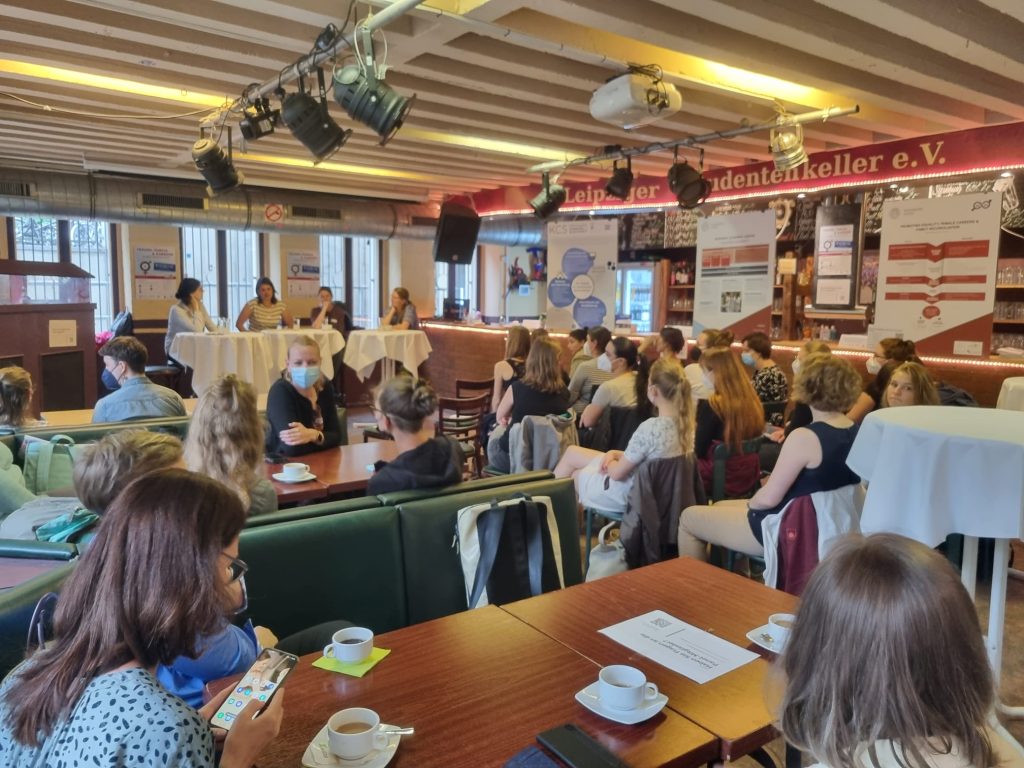
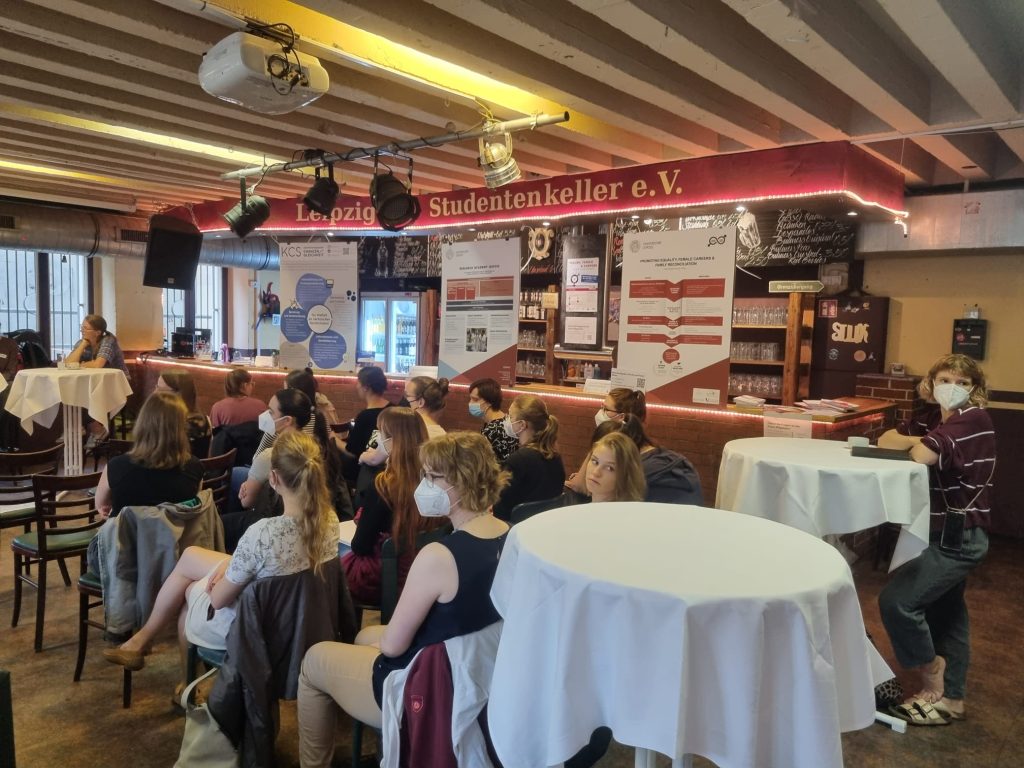
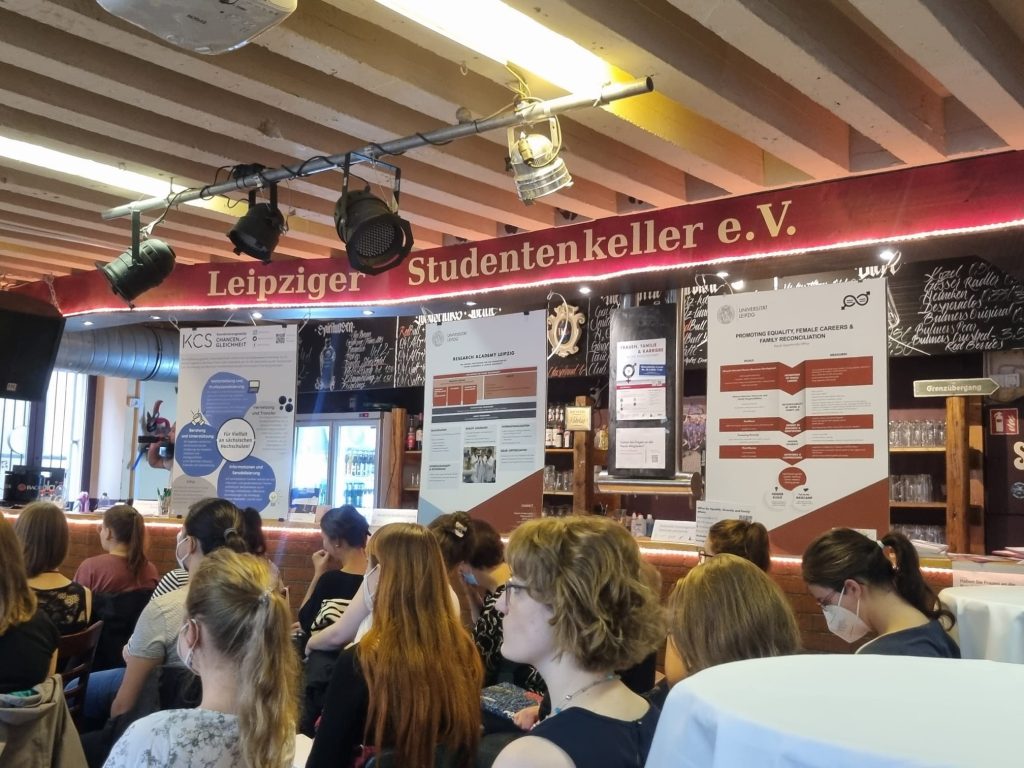
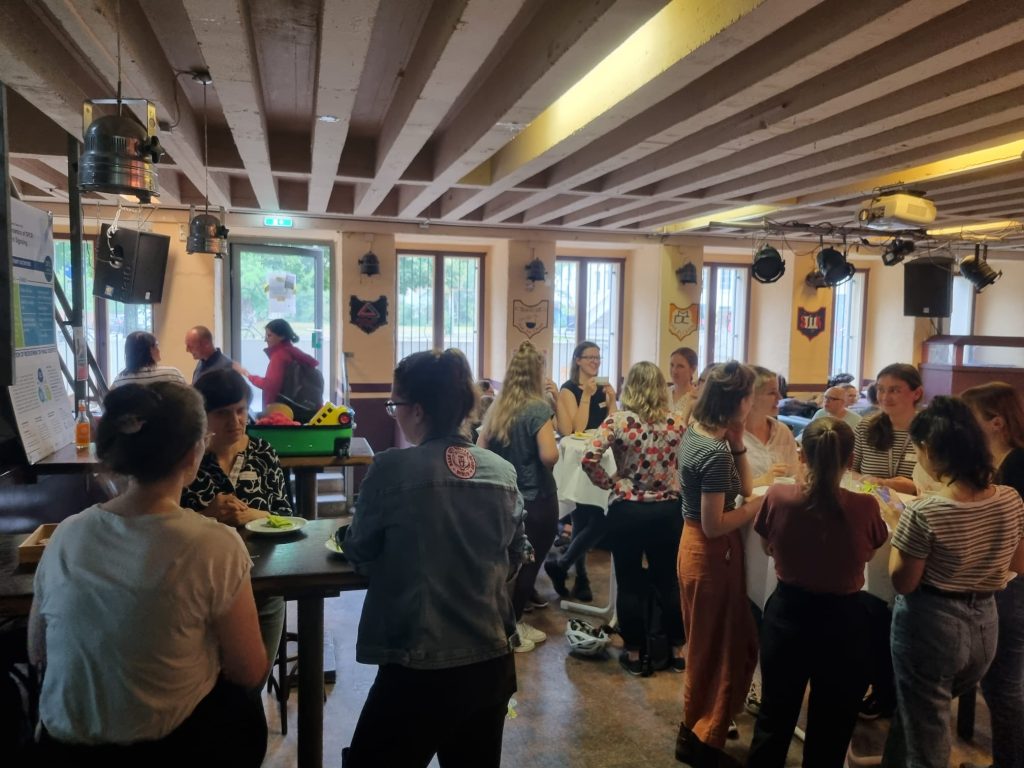
FRAUEN, FAMILIE & KARRIERE IN DER WISSENSCHAFT (20.06.2022 I 11 UHR I STUK)
Podiumdiskussion & Netwerktreffen

Der SFB1052, SFB1199 und SFB1423 veranstalten am 20.06.22 von 11 bis 13 Uhr im STUK Leipzig (Nürnbergerstraße) eine Podiumsdiskussion zu “Frauen, Familie und Karriere in der Wissenschaft“, mit anschließendem Netzwerktreffen.
Für die Podiumsdiskussion haben wir Professorinnen und Nachwuchswissenschaftler:innen eingeladen, welche kurz über Ihre persönlichen Karrierewege sprechen und Ihre wichtigsten Entscheidungen und Wendepunkte vorstellen. Im Anschluss besteht bei einem kleinen Mittagsimbiss die Möglichkeit auf einem “Markt der Möglichkeiten” miteinander zu netzwerken. Unterstützt wird die Veranstaltung von der Research Academy Leipzig und dem Gleichstellungsbüro der Universität Leipzig.
Ihre Anmeldung nehmen wir gerne über das Online-Anmeldeformular oder per E-Mail an entgegen. Die Podiumsdiskussion ist in deutscher Sprache.
BILDER VOM EVENT
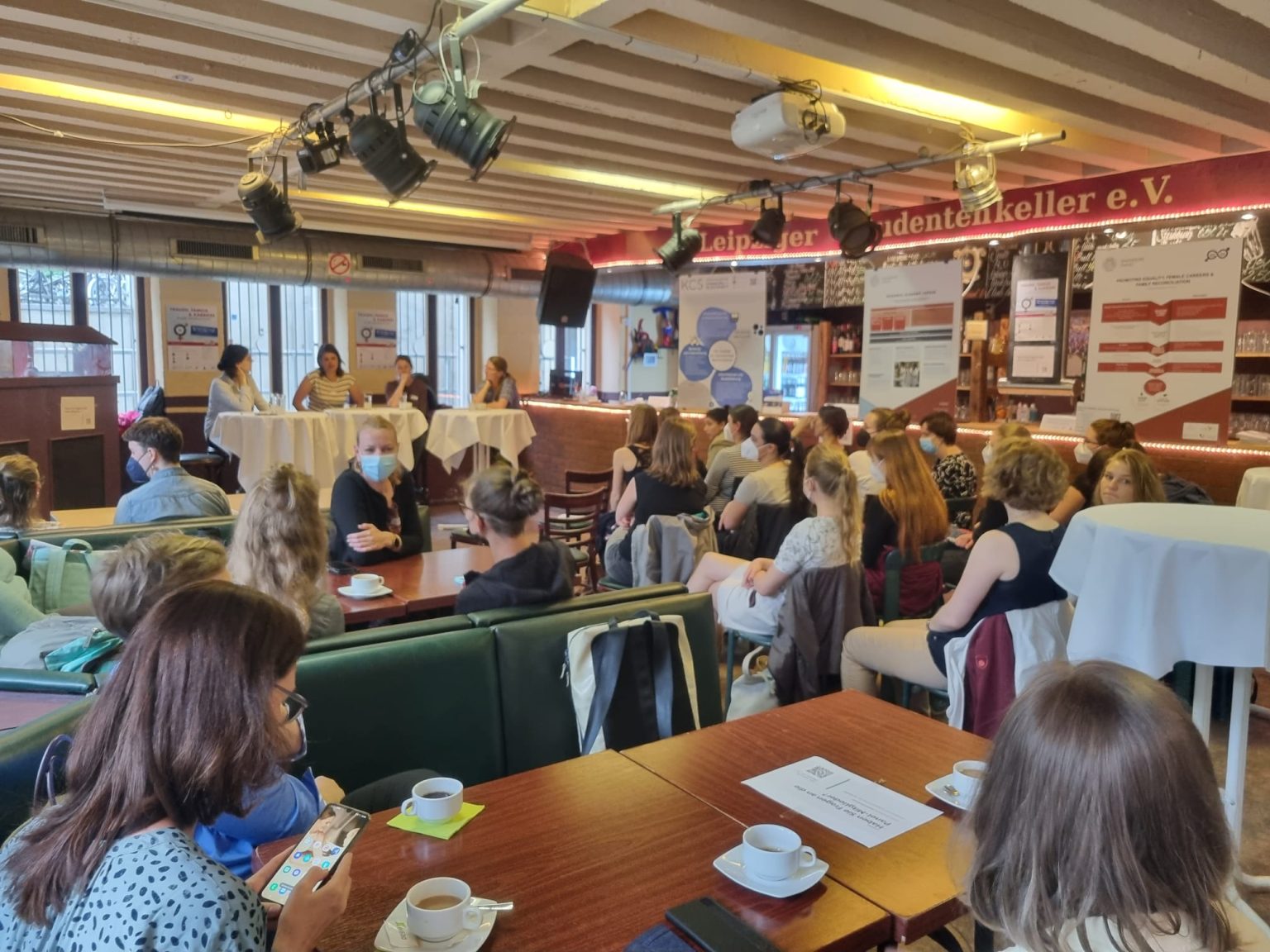
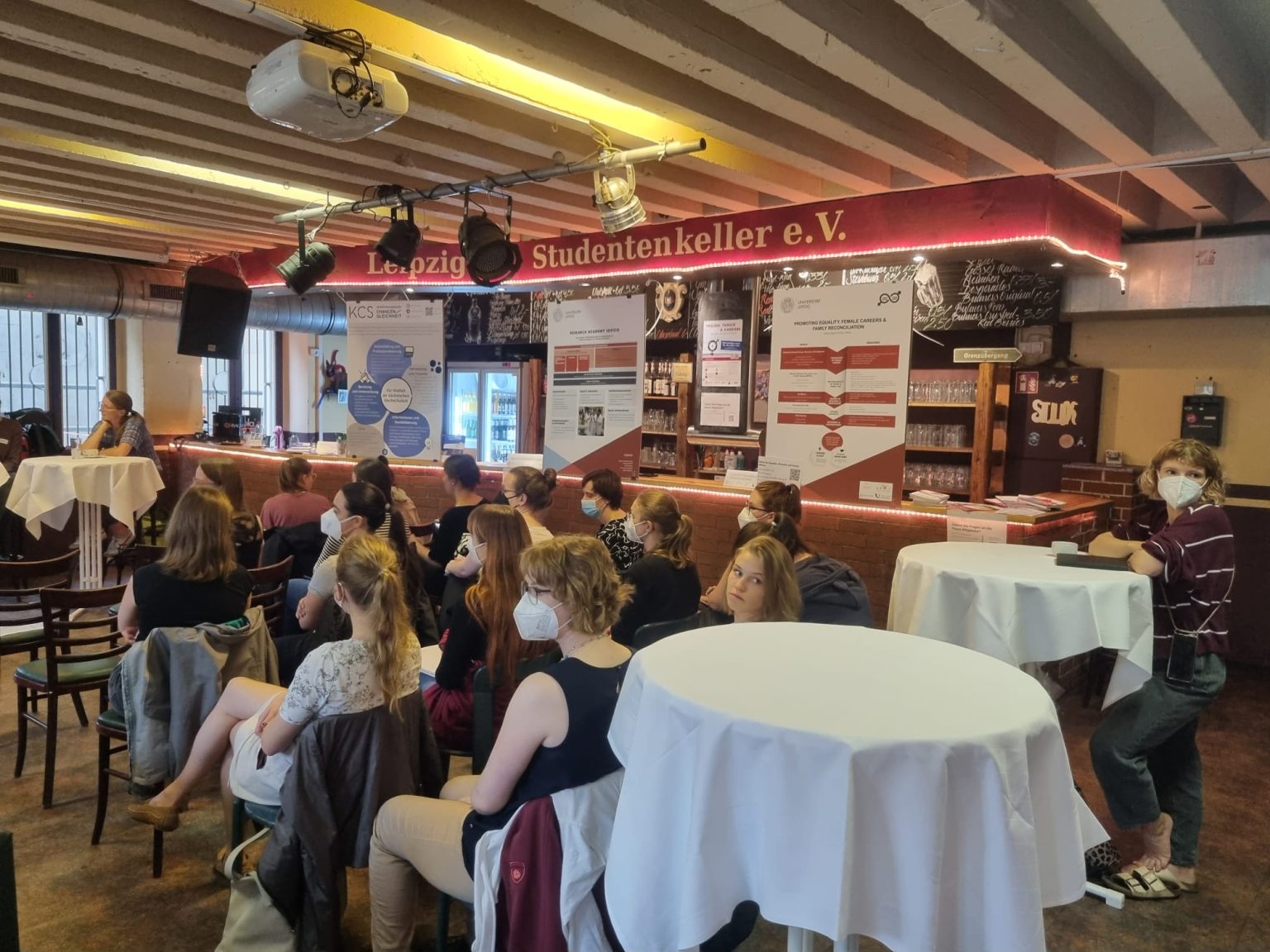
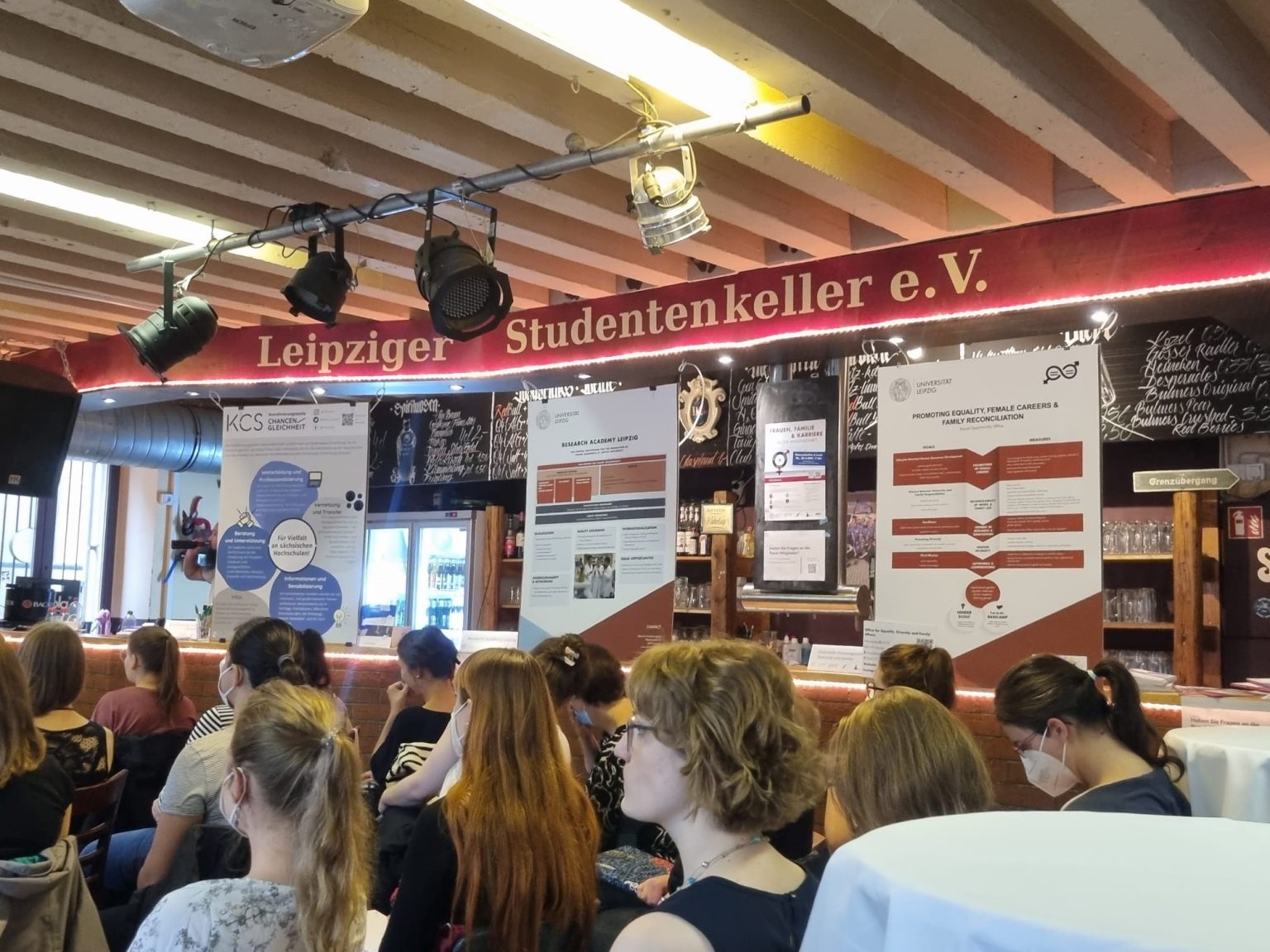
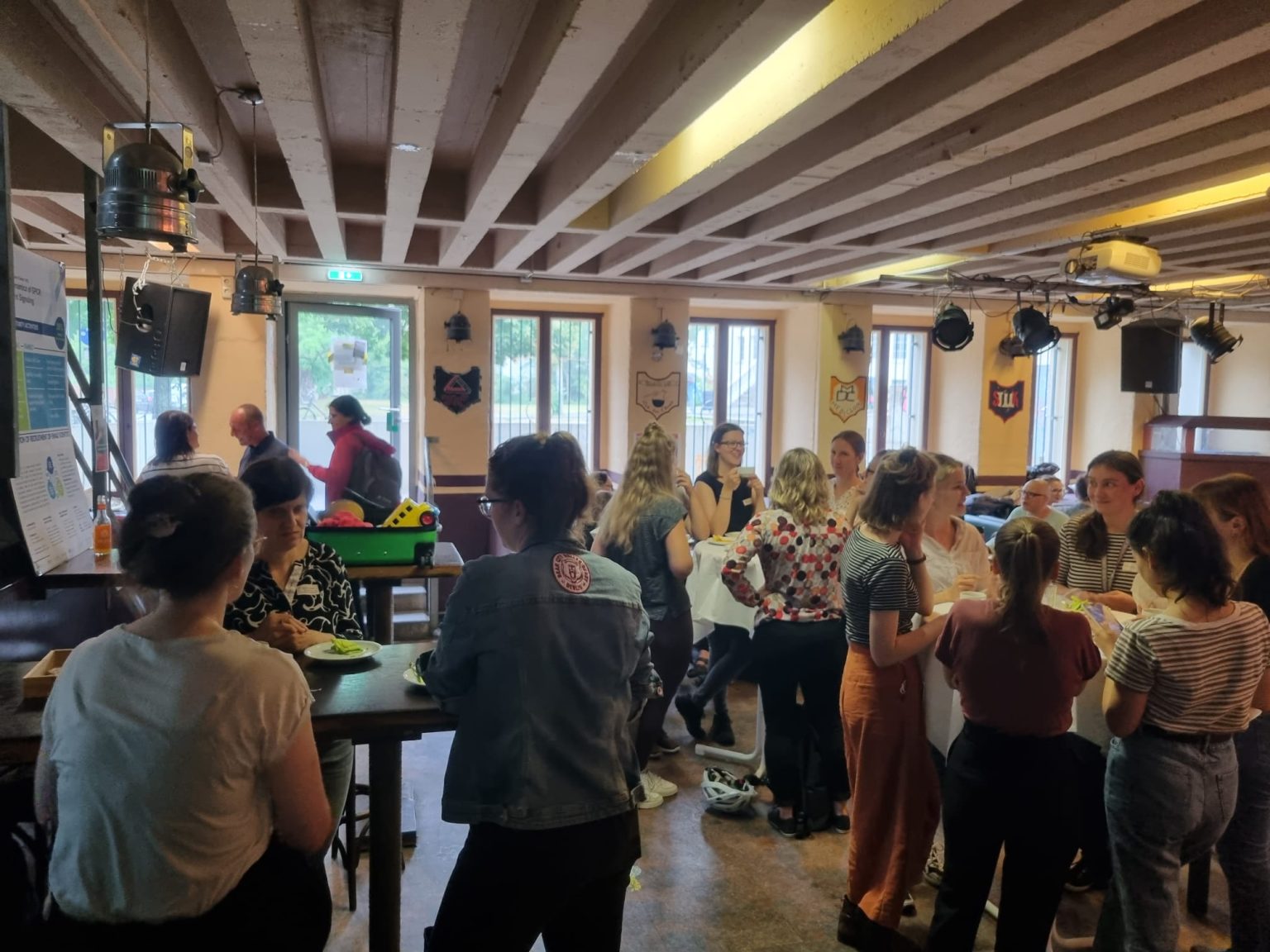
Programm
Die Vereinbarkeit von Wissenschaft und Familie ist nach wie vor eine große Hürde in den Karrieren junger Wissenschaftler:innen. Zeitliche Flexibilität, Konferenzreisen und ein hohes Maß an Aufopferung für berufliche Ziele sind oft nur schwer unter einen Hut zu bringen mit den Bedürfnissen von Kindern und Eltern. Auch wenn viele dieser Probleme einen strukturellen Charakter haben, glauben wir, dass es sinnvoll ist, sich über persönliche Erfahrungen und individuelle Lösungsansätze auszutauschen. Solche Gespräche können dabei helfen, einen Umgang mit eigenen Herausforderungen zu finden und sensibilisieren gleichsam für zugrundeliegende Probleme im Wissenschaftssystem.
Beim der Podiumsdiskussion der Leipziger DFG-Forschungszentren soll es genau darum gehen: Einen Austausch über die Grenzen des eigenen Fachs und des eigenen Forschungsumfelds hinweg und eine Vernetzung mit Menschen, die ähnliche Erfahrungshintergründe teilen. Deshalb laden wir alle Nachwuchswissenschaftler:innen, ins Gespräch zu kommen. Väter, die gerade aus der Elternzeit zurück sind, junge Frauen, die Angst vor einem Karriereknick nach der Schwangerschaft haben, mehr oder weniger erfolgreiche Familienmanager:innen – jede Perspektive bereichert den Austausch.
Thematisch gerahmt wird die Veranstaltung durch eine Diskussion relevanter Wende- und Höhepunkte in den Karrieren von Wissenschaftler:innen aus Leipzig. In kurzen, pointierten Fragerunden werden die Teilnehmer:innen gebeten, ein Schlaglicht auf besondere Herausforderungen und Erfolge bei der Vereinbarkeit von Wissenschaft und Familie zu werfen, bevor die Runde für eine breitere Diskussion geöffnet wird. Im Anschluss besteht die Möglichkeit, bei Snacks und Getränken Themen zu vertiefen und Kolleg:innen aus anderen Fachbereichen kennen zu lernen, sowie auf einem “Markt der Möglichkeiten” die verschiedenen Angebote und Instrumente an der Universität kennenzulernen.
Für eine Betreuung des Nachwuchses sorgen wir in der Zeit und wir sind natürlich rechtzeitig fertig, um pünktlich zu Schule und Kindergarten zu kommen!

